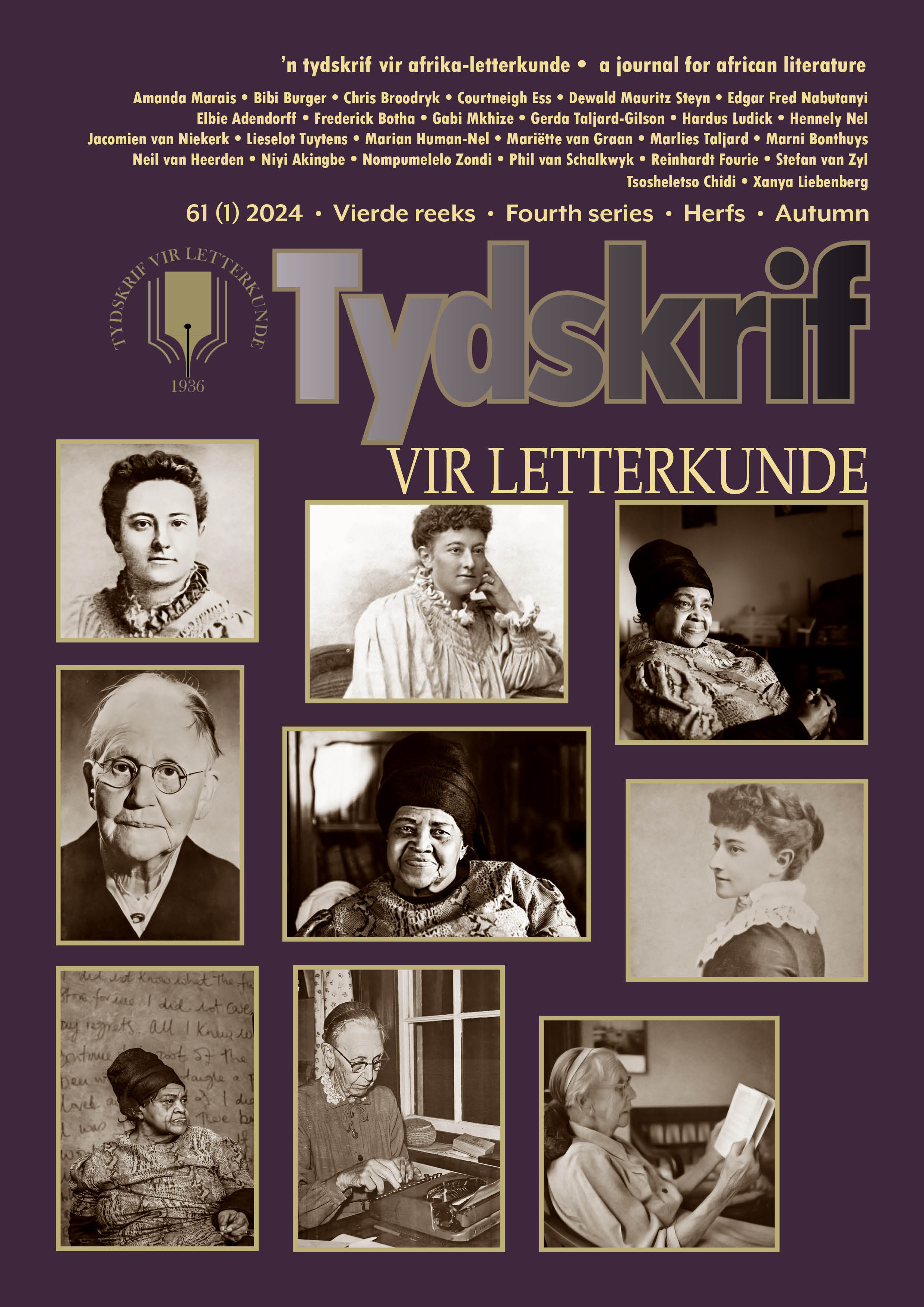Citoyenneté et statut social dans Muriel at Metropolitan de Miriam Tlali
DOI :
https://doi.org/10.17159/tl.v61i1.16064Mots-clés :
intersectionnalité, citoyenneté, statut social, apartheid, droit coutumier africain, Miriam TlaliRésumé
Dès les années 1970, les textes littéraires sud-africains reflétaient une position féministe intersectionnelle. L’œuvre pionnière de Miriam Tlali, Muriel at Metropolitan (1975), par exemple, aborde la façon dont les femmes noires sont confrontées de la manière la plus palpable à des oppressions et des inégalités croisées en raison de la race, de l’ethnicité, du genre et de la classe qui se renforcent mutuellement. Ces catégories sociales ont servi de base pour différencier les groupes les uns des autres et ont été utilisées pour créer des relations de pouvoir inégales. Ces inégalités ont été créées non seulement par le régime de l’apartheid, mais aussi par le droit coutumier africain, bien que ce dernier ait subi la double influence du colonialisme et de l’apartheid. Dans cet article, j’analyse cinq passages clés du roman dans une optique intersectionnelle en examinant la corrélation entre ces systèmes, les axes intersectionnels, la citoyenneté et le statut social. La lecture attentive des extraits montre que les droits civils des personnages sont restreints et que leur statut social est réduit, notamment par le biais de stéréotypes déshumanisants, de stratégies de dénomination raciale et sexiste et de pronoms polarisants. En outre, les contre-réactions discursives de Muriel, la protagoniste noire, sont décrites. Celles-ci consistent en une argumentation rationnelle, une rupture des normes, une objectivation et des techniques de distanciation. Ses répliques représentent sa résistance contre de multiples subjugations et prennent la forme de ce que l’on appelle aujourd’hui le(s) féminisme(s) intersectionnel(s).
Téléchargements
Références
Allott, Antony. New Essays in African Law. Butterworth, 1970.
Arndt, Susan. “Perspectives on African Feminism: Defining and Classifying African-Feminist Literatures.” Agenda vol. 17, no. 54, 2002, pp. 31–44.
Bennett, Thomas W. A Sourcebook of African Customary Law for Southern Africa. Juta, 1991.
Bennett, Thomas W. The Application of Customary Law in Southern Africa: The Conflict of Personal Laws. Juta, 1985.
Boswell, Barbara. And Wrote My Story Anyway: Black South African Women’s Novels as Feminism. Wits U P, 2020. DOI: https://doi.org/10.18772/12020096185
Boswell, Barbara. “Echoes of Miriam Tlali.” Surfacing: On Being Black and Feminist in South Africa, edited by Desiree Lewis & Gabeba Baderoon. Wits U P, 2021, pp. 198–214. DOI: https://doi.org/10.18772/22021046093.18
Boswell, Barbara. “Overcoming the ‘Daily Bludgeoning by Apartheid’: Black South African Women Writers, Agency, and Space.” African Identities vol. 15, no. 4, 2017, pp. 414–27. DOI: https://doi.org/10.1080/14725843.2017.1319754. DOI: https://doi.org/10.1080/14725843.2017.1319754
Boswell, Barbara. “Rewriting Apartheid South Africa: Race and Space in Miriam Tlali and Lauretta Ngcobo’s Novels.” Gender, Place & Culture vol. 23, no. 9, 2016, pp. 1329–42. DOI: https://doi.org/10.1080/0966369X.2016.1160035. DOI: https://doi.org/10.1080/0966369X.2016.1160035
Carastathis, Anna. Intersectionality: Origins, Contestations, Horizons. U of Nebraska P, 2016. DOI: https://doi.org/10.2307/j.ctt1fzhfz8
Collins, Patricia Hill et al. “Intersectionality as a Critical Social Theory.” Contemporary Political Theory vol. 20, no. 3, 2021, pp. 690–725. DOI: https://doi.org/10.1057/s41296-021-00490-0. DOI: https://doi.org/10.1057/s41296-021-00490-0
Cullhed, Christina. Grappling with Patriarchies: Narrative Strategies of Resistance in Miriam Tlali’s Writings. Uppsala, 2006.
Elias, Taslim Olawale. The Nature of African Customary Law. Manchester U P, 1956.
Ettin, Andrew Vogel. Betrayals of the Body Politic: The Literary Commitments of Nadine Gordimer. U of Virginia P, 1993.
Gouws, Amanda. “Feminist Intersectionality and the Matrix of Domination in South Africa.” Agenda vol. 31, no. 1, 2017, pp. 19–27. DOI: https://doi.org/10.1080/10130950.2017.1338871. DOI: https://doi.org/10.1080/10130950.2017.1338871
Gqola, Pumla Dineo. Miriam Tlali: Writing Freedom. HRSC, 2021.
Hames, Mary. “Teaching Black, Teaching Gender, Teaching Feminism.” Surfacing: On Being Black and Feminist in South Africa, edited by Desiree Lewis & Gabeba Baderoon. Wits U P, 2021, pp. 56–72. DOI: https://doi.org/10.18772/22021046093.8
Himonga, Chuma & Thandabantu Nhlapo. African Customary Law in South Africa: Post- Apartheid and Living Law Perspectives. Oxford U P Southern Africa, 2014.
Lewis, Desiree & Gabeba Baderoon. Introduction. Surfacing: On Being Black and Feminist in South Africa. Wits U P, 2021, pp. 1–14. DOI: https://doi.org/10.18772/22021046093.4
Meer, Shamim. “Freedom for Women: Mainstreaming Gender in the South African Liberation Struggle and Beyond.” Gender and Development vol. 13, no. 2, 2005, pp. 36–45. DOI: https://doi.org/10.1080/13552070512331332285
Moolman, Benita. “Rethinking ‘Masculinities in Transition’ in South Africa Considering the ‘Intersectionality’ of Race, Class, and Sexuality with Gender.” African Identities vol. 11, no. 1, 2013, pp. 93–105. DOI: https://doi.org/10.1080/14725843.2013.775843. DOI: https://doi.org/10.1080/14725843.2013.775843
Muhlebach, Andrea. “Between the Fires: Gender and Post-Apartheid Reasoning in Two South African Novels: Nadine Gordimer’s Burger’s Daughter, and Miriam Tlali’s Muriel at Metropolitan.” Journal of Postcolonial Writing vol. 36, no. 1, 1997, pp. 65–85. DOI: https://doi.org/10.1080/17449859708589263. DOI: https://doi.org/10.1080/17449859708589263
Nash, Jennifer C. “Feminist Originalism: Intersectionality and the Politics of Reading.” Feminist Theory vol. 17, no. 1, 2016, pp. 3–20. DOI: https://doi.org/10.1177/1464700115620864. DOI: https://doi.org/10.1177/1464700115620864
Ndulo, Muna. “African Customary Law, Customs, and Women’s Rights.” Indiana Journal of Global Legal Studies vol. 18, no. 1, 2011, pp. 87–120. DOI: https://doi.org/10.2979/indjglolegstu.18.1.87. DOI: https://doi.org/10.2979/indjglolegstu.18.1.87
Obiora, Leslye Amade. “Reconsidering African Customary Law.” Legal Studies Forum vol. 17, no. 3, 1993, pp. 217–52.
Samuelson, Meg. “Writing Women.” The Cambridge History of South African Literature, edited by David Atwell & Derek Attridge. Cambridge U P, 2012, pp. 757–78. DOI: https://doi.org/10.1017/CHOL9780521199285.038
Tamale, Sylvia. Decolonization and Afro-Feminism. Daraja, 2020.
Tlali, Miriam. Muriel at Metropolitan. Ravan, 1975.
Wing, Adrien Katherine & Eunice P. de Carvalho. “Black South African Women: Toward Equal Rights.” Harvard Human Rights Journal vol. 8, 1995, pp. 57–100.
Winker, Gabriele & Nina Degele. “Intersectionality as Multi-Level Analysis: Dealing with Social Inequality.” European Journal of Women’s Studies vol. 18, no. 1, 2011, pp. 51–66. DOI: https://doi.org/10.1177/1350506810386084. DOI: https://doi.org/10.1177/1350506810386084
Yuval-Davis, Nira. “Intersectionality and Feminist Politics.” European Journal of Women’s Studies vol. 13, no. 3, 2006, pp. 193–209. DOI: https://doi.org/10.1177/1350506806065752. DOI: https://doi.org/10.1177/1350506806065752
Téléchargements
Publiée
Numéro
Rubrique
Licence
(c) Copyright Tydskrif vir Letterkunde 2024

Ce travail est disponible sous licence Creative Commons Attribution - Partage dans les Mêmes Conditions 4.0 International.


 https://orcid.org/0000-0001-6465-6584
https://orcid.org/0000-0001-6465-6584


.png)